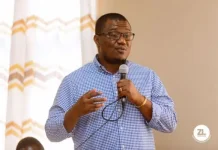Blood transfusions are one of the most critical treatments for sickle cell patients. But very few Ghanaians donate blood. The National Blood Service Ghana offers Blood donation in four easy steps.
These are Registration, Screening, Donation and Resting/Refreshment. The only requirement is to be healthy, and the rest of the work is done for you.
We hit the streets of Accra to interview a few people, asking them if they have ever donated some blood. The common answer was no. One interviewee said ‘I have never donated blood because I don’t like syringes”. Another person said she hasn’t because she feels she doesn’t have enough blood.
In episode 4 of the award-winning series, AirtelTigo Touching Lives, in partnership with the International Sickle Cell Centre (ISCC), we discuss the benefits of blood donation, addressed the fears surrounding blood donation and encouraged Ghanaians to donate some blood if eligible.
Experiences of a Mother & Caregiver of a Sickle Cell warrior
• Comfort Sey, a mother and caregiver to a 25-year-old son with SCD disclosed that SCD is a sickness that has really changed her life. When her son was 1 year, 2 months old, he started to experience the symptoms of SCD. I struggled to care for him until he was 8 years old. I realised his hands, knee and legs were all swollen.
• I had taken him to so many hospitals but he wasn’t getting any better. I took him to another health facility and that was when they informed us he had fluid in his knees that needed to be extracted. Even though the fluid was extracted, his legs got swollen again the next morning. He was therefore transferred to the theatre for an emergency operation. After the surgery, he had low blood levels but that day was a holiday so I wasn’t sure where we would be able to find some blood. The situation became very fatal.
• Comfort shared she could only pray and call on God to help until a doctor came and inquired about the cases on the ward. He was informed by the nurses that a young boy was in a critical state and the situation looked hopeless. But the doctor believed otherwise so he rushed into an ambulance to a near-by clinic to get two pints of blood for Comforts son.
• When the blood finally came in, it was difficult to locate a vein for the transfusion but the doctor persisted. Comfort referred to the doctor as being “God-sent”, because he saved her sons life. After a while, her son regained consciousness because of the blood he received. Her son is almost 25 years old now.
The Importance of Blood Donation to SCD patients
• Dr. Dilys John-Teye, Head of the Southern Zonal Blood Centre and Senior Consultant at the ISCC spoke about the importance of blood transfusions to SCD patients. She stated that blood transfusions are very important for people living with SCD. Rather than the 120 days lifespan of normal red blood cells, the red blood cells of sickle cell patients live for approximately 10-20 days.
The cells therefore die early so people living with the condition sometimes tend to require blood transfusions to be able to supply adequate amount of oxygen to vital body organs to prevent morbidity and mortality.
• “People may not know or understand the value of blood until they find themselves in need of one. Since blood cannot be manufactured, we can only rely on donations from people like you and I”, Dr. Mary Ansong, Founder and CEO of the ISCC stated.
She appealed to those in good health and between the ages of 17-60, to donate some blood. She also clarified that donors will be thoroughly assessed to ensure they meet the eligibility criteria.
Dr. Ansong assured us that we will not contract a disease from donating blood, nor will we die from donating blood. She also debunks the myth that donated blood will be used for rituals. She reiterated that one blood donation can save three lives.
• The head of Brands and Communications at AirtelTigo Nancy Asiedu-Amrado, reminded viewers that sickle cell patients depend on blood donors to survive certain complications of the disease. She emphasized that the AirtelTigo team, out of love and care, volunteered to donate blood solely for sickle cell patients through the National Blood Service.
She, therefore, encouraged all Ghanaians to donate some blood when the call is made, as this is one of the ways we can show support to people living with SCD.
AirtelTigo Touching Lives is a corporate social initiative of AirtelTigo. The Sickle Cell Edition is done in partnership with the International Sickle Cell Centre (ISCC) and will feature medical experts from the ISCC, persons living with SCD, relatives, caregivers and SCD advocates.
Episodes can be found on AirtelTigo’s YouTube and Facebook channels as well as ISCC’s Facebook and Instagram handles.






































